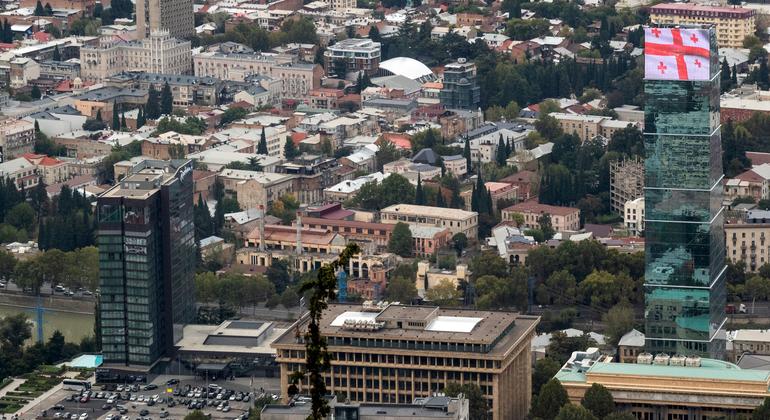The recent protests in the capital city of Tbilisi, Georgia have sparked international concern over the use of disproportionate and unnecessary force by the police against demonstrators and journalists. High Commissioner for Human Rights, Volker Türk, expressed alarm over reports of injuries sustained by dozens of protesters and media workers during the demonstrations, which were prompted by the prime minister’s announcement to delay negotiations on joining the European Union.
Security forces were reported to have utilized pepper spray, water cannons, and chemical irritants against protesters and journalists, with some individuals also being chased and physically assaulted by unidentified assailants. Mr. Türk condemned the use of excessive force, stating that all Georgians should be able to peacefully express their views on the future of their country without fear of violence.
International human rights standards emphasize the importance of creating a conducive environment for the exercise of rights, including the right to peaceful assembly, without discrimination. Any use of force by security personnel must be justified by the principles of legality, necessity, proportionality, precaution, and non-discrimination, according to the UN rights office, OHCHR.
In addition to calling for accountability for those responsible for human rights violations, High Commissioner Türk also urged protesters to demonstrate restraint in their actions. Reports indicated that protesters had thrown rocks, fireworks, and bottles at security forces, causing damage to the parliament building and resulting in injuries to at least 113 Ministry of Interior staff members.
The Special Investigation Service of Georgia, an independent institution responsible for investigating allegations against law enforcement officials, announced that it has initiated an inquiry into the abuse of official authority by police officers during the protests. Mr. Türk stressed the importance of holding individuals accountable for their actions and investigating allegations of ill-treatment of detainees, particularly in cases where officers lack identifiable markers such as nametags or individual identification numbers.
The High Commissioner emphasized the need to address the issue of identifying individual responsibility among law enforcement officers in Georgia, as highlighted in the OHCHR’s Guide on Less Lethal Weapons in Law Enforcement. The guide recommends that authorities ensure law enforcement officials are identifiable by wearing nametags or individually assigned service numbers.
According to the Ministry of Interior, at least 224 people were detained over the course of the four nights of protests, facing charges of petty hooliganism and disobeying police orders. Mr. Türk expressed concern over reports that children were among those detained, emphasizing the importance of upholding the rights of all individuals, regardless of their age.
The incidents in Tbilisi underscore the ongoing challenges in ensuring accountability and respect for human rights in law enforcement operations. The international community, including the United Nations and human rights organizations, will continue to monitor the situation in Georgia and advocate for the protection of fundamental rights and freedoms for all individuals, including the right to peaceful protest and freedom of expression.









